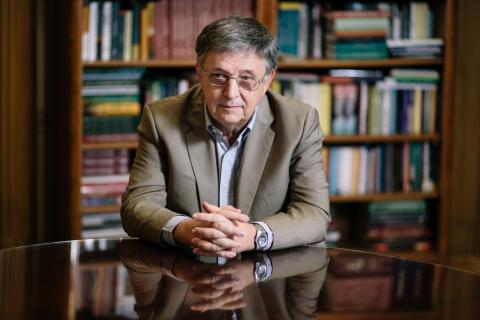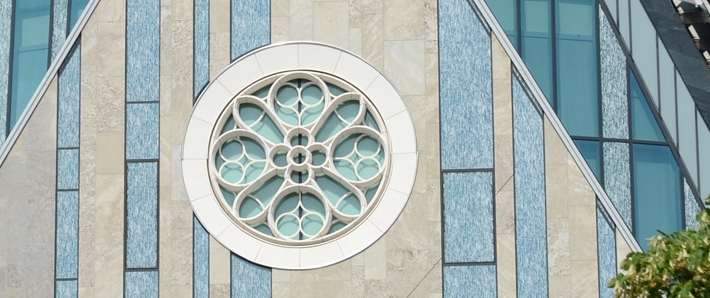Gauß-Vorlesung in Leipzig: "Discrete or Continuous?"
Festveranstaltung der Deutschen Mathematiker-Vereinigung
Dienstag, 22. November 2022, Paulinum der Universität Leipzig, 18:30 UhrProgramm
Grusswort des Prorektors für Exzellenzentwicklung, Prof. Dr. Karl-Jens Eilers
Eröffnungsvortrag “Felix Kleins Gauß-Programm” von Dr. Renate Tobies (Friedrich-Schiller-Universität Jena)
Gauß-Vorlesung “Discrete or continuous?” von Prof. Dr. László Lovász (Eötvös Loránd Universität, Budapest)
Empfang im Foyer des Neuen Augusteums
Musikalische Begleitung: Prof. David Timm, Leipziger Universitätsmusikdirektor
Prof. Dr. László Lovász
Eötvös Loránd University Budapest und Alfréd Rényi Institute of Mathematics Budapest
Discrete or Continuous?
From Zeno's paradoxes to quantum physics, the question of the continuous nature of our world has been prominent and remains unanswered. From a mathematical point of view, discrete structures or models behave quite differently from continuous ones. The great success story of mathematics from the 18-th century has been the development of analysis. Discrete mathematics had a later start, with a large boost from computers.
However, these worlds are not as far apart as they seem. Computers force us to approximate continuous structures by finite ones; but perhaps more surprisingly, very large finite structures can be very well approximated by continuous structures, often getting rid of inconvenient details. These approaches cross-fertilize each other.
Prof. Dr. László Lovász
László Lovász obtained his doctoral degree in mathematics from the Eötvös Loránd University (Budapest, Hungary, 1971). He is a member of the Hungarian Academy of Sciences, Leopoldina, and several other Academies. He served as President of the International Mathematical Union and President of the Hungarian Academy of Sciences. His awards include the Wolf Prize, the Kyoto Prize and the Abel Prize. His field of research is discrete mathematics, its applications to the theory of computing, and its interactions with classical mathematics.

Dr. Renate Tobies
Friedrich-Schiller-Universität Jena
Felix Kleins "Gauß-Programm"
Der Vortrag zeigt, wie Klein an Gauß anknüpfte und versuchte, dessen Breite zu erreichen. Zugleich soll ein Einblick in Kleins innovative Ideen gegeben werden, der auch als Reformator des Universitätsbetriebs bezeichnet werden kann. Besondere Aufmerksamkeit gilt der Leipziger Zeit. Dazu blicken wir auch in Kleins Protokollbuch eines Seminars, an dem der bedeutende ungarische Mathematiker G. Rados beteiligt war.

Dr. Renate Tobies
Renate Tobies is a historian of mathematics and science at the Friedrich Schiller University in Jena (Germany). After completing her academic degrees at the University of Leipzig, she served as the managing editor of NTM: Journal for the History of Science, Technology, and Medicine for twenty years. She was a visiting professor at the University of Kaiserslautern and an interim professor of the history of science and technology at the University of Stuttgart. Throughout her career, she has held additional visiting professorships in Braunschweig, Saarbrücken, Jena, Linz, and Graz. Her main research fields are the history of mathematics and its applications, and women in mathematics, science, and technology. She has published more than ten books and hundreds of articles. She is a full member of the Académie Internationale d’Histoire des Sciences (Paris) and a foreign member of the Agder Academy of Sciences and Letters (Kristiansand, Norway).
Musikalische Begleitung
Programm
- David Timm (*1969)
piano exercise
-
David Timm
Siegfried
-
Roland Hanna (1932-2002)
Big bad Henry


Termin
22. November 2022, Beginn 18:30 Uhr
Dauer der Veranstaltung: etwa 2 Stunden
Ort: Paulinum der Universität Leipzig
Augustusplatz, 04109 Leipzig

Frühere Gauß-Vorlesungen:
mathematik.de/dmv/gauss-vorlesungen
